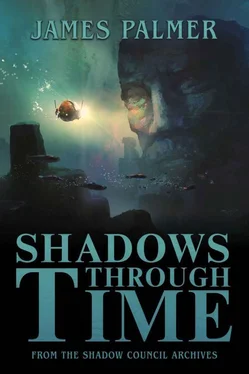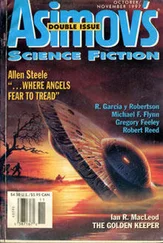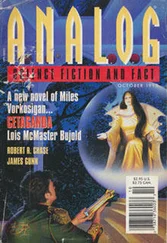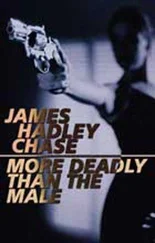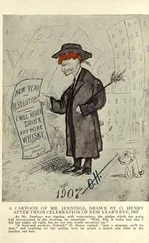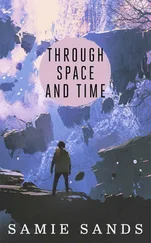“What are you doing?” said Nemo. “Stop.”
“No,” said Elizabeth Marsh. “He has the right idea. Everyone, smash the machine!”
Everyone went to work, hammering, smashing, and shooting at the machine. They had no idea if it would do any good, but they did it anyway. It made as much as sense as anything else in this place, and it took Burton’s mind off the feeling of encroaching dread that threatened to pummel him into insanity.
Their efforts attracted the attention of the Elder Things, who were little match for the guns of Captain Nemo’s men. A section of the machine fell with a bone-shaking clang, and everyone redoubled their efforts. Burton kept smashing at the artifact, the brittle green metal cracking slightly. He struck it a final time, and there was a flash of green light as it came off. He caught it with his free hand. It was warm. An electric shock went through him, and he squeezed his eyes shut.
Burton was falling into green depths where thick, swirling things writhed in the gloom. He counted himself lucky that he could not see them fully. He was in a dense, roiling fog, worse than any London pea-souper he had ever experienced. Hideous black shapes heaved up in the distance, inhuman outlines ripe with vague menace. He heard a membranous wing flap, saw a vast tentacle slowly unfurl. A thing made of soap bubbles moved perilously close. A giant pyramid-shaped form shambled past. The fog cleared somewhat, and there, in the distance, atop some grotesque alien throne made of spires of green metal, was the shape he had seen carved into the wall of the Palace of the Machine, vast leathern wings jutting from its back, its head a writhing octopus.
The inhuman god-thing man called Cthulhu glared at Burton with callous, cosmic indifference, filling the explorer with more dread and fear than he had ever felt. He was too afraid to look at it, yet he could not look away. It stared at him as he would an insect, not with cold malice but mild annoyance. Burton understood from the entity’s inhuman gaze that it knew he was no threat to it. There was nothing Burton could say or do that would sway the creature from getting what it wanted. The grotesque things moving around it seemed to be making placating gestures with tentacles, webbed claws, and feelers, and Burton realized they were just as frightened of their alien god as he was.
Then the ground shook, and Burton fell once more. He opened his eyes with a start, looking around. Chunks of green stone were falling to the ground, smashing bits of the machine as it, too, started to come apart and plummet to the chamber floor.
“Burton!” Nemo shouted. “We’ve got to get out of here. Come on!”
Burton looked at his empty left hand. He had been holding something, hadn’t he? Yes. He looked down at the artifact. Their vandalizing of the machine had done something. Scowling, the explorer stabbed at the abhorrently sculpted piece of metal with his boot, cracking the brittle metal. Then he holstered his pistol, turned, and ran with the others.
The green city crumpled and fell, walls tumbling in on themselves, blasphemous porticos and oddly-dimensioned ramparts collapsed and turned to dust. Neanderthals uttered liquid screams as they died under the crumbling architecture.
Burton, Elizabeth, Herbert, Challenger, Nemo, and his men made a beeline for the coast, where more boats no doubt waited to return them to the relative safety of the Nautilus . The ground fractured around them, dropping stubby cycads into the abyss created. Streaks of glowing red appeared out of the cracks, and Burton’s nose cringed at the sulfur and noxious gases that filled the air.
They made it to the beach unmolested, but the very sea thrashed along with the island’s death throes, tossing Nemo’s wondrous inflatable boats about.
Shouldering their guns, Nemo’s men thrust themselves into the churning water to get control of the boats, grabbing their tethers as if trying to calm frightened horses. Nemo jumped into the nearest boat, followed by Elizabeth and Herbert. Burton and Challenger leaped into a nearby boat and helped Nemo’s men hold it down so enough of them could get on that they could all depart from this place of nightmares.
Burton didn’t remember much of that harrowing ride back to the Nautilus . It all happened so fast. When he climbed inside, Burton thought he would never be so glad to see the machine of wonders once again, and he slapped its firm metal hull to reassure himself that he was inside its comforting confines once more.
Herbert curled into a ball in the observation lounge and gibbered himself to sleep. Nemo brought the Nautilus out more than a hundred miles from the decaying, collapsing island, and watched the rest of its destruction through his periscope, the ocean waters churning as the nightmare of R’lyeh sank beneath the waves. At daybreak, Challenger kicked Herbert awake and Captain Nemo sent him into the bowels of the submarine to use his Time Machine to take them home.
Burton did not bother to watch as they hurtled through the ages, making the journey in his stateroom, lying on his bed with his eyes squeezed shut. He did not need to witness the slow march of Time unfolding in its proper order. He did not need to see the creatures of the deep being born and dying in an eye blink, or the countless generations that would thrive and wane between the ticks of a second. At some point, he fell asleep and dreamed of groggy green depths where things that were not men pondered man’s existence and plotted against him.
He awoke to a knock on the door. Burton got up, knuckling grit from his eyes, and opened it.
“We’re back,” said Challenger. His eyes were half-mad and watery, and Burton couldn’t decide if the boisterous zoologist had always looked like that.
“There’s no sign of undersea upheaval,” Challenger continued. “The sea floor is as calm as a mill pond. Whatever we did, we stopped R’lyeh from returning to the surface in our own time.”
Burton nodded. “Or we just postponed its arrival,” he murmured.
Challenger started to say something in rebuttal, then thought better of it. “Nemo has already set course for England. “We’re going home, old son.” He clapped Burton hard on the shoulders with both hands, a devil-may-care grin on his lips, before departing. Burton watched him go—not stopping at his stateroom but continuing onward toward Nemo’s amazing museum—and closed the door.
Burton put on his jubba and meditated, then slept. Then meditated some more. He went to the galley for some food, and was offered a shot of whiskey from the secret, and no doubt contraband, flask belonging to Nemo’s cook, a French-speaking Chinese man who fixed Burton with a toothless smile as he wandered in.
Everyone, for the most part, kept to themselves on that long, uneventful journey homeward. Burton yearned for home, as much as he had once longed to be anywhere else. He missed Isabel. He tried to write in his journal, but couldn’t. He couldn’t wrap his mind around everything he had seen and witnessed. No one would believe him anyway, and for some reason, writing about Captain Nemo and his amazing submarine seemed unfair to Nemo and his crew, like telling tales out of school. He was certain that, this adventure aside, Nemo wanted nothing more than to be left alone, and Burton was adamant about letting the man have his wish. He had certainly earned that right.
Herbert was recovering quite well. Burton found him in Nemo’s museum on several occasions, pouring over display cases with Professor Challenger or playing cards with Elizabeth Marsh, who he seemed to have taken a shine to. Everyone spoke of mundane things. It was easier than trying to understand what they had just been through together. Challenger dickered with Nemo in an effort to buy off some of the captain’s museum specimens. Herbert unhooked the Time Machine from the Nautilus .
Читать дальше
